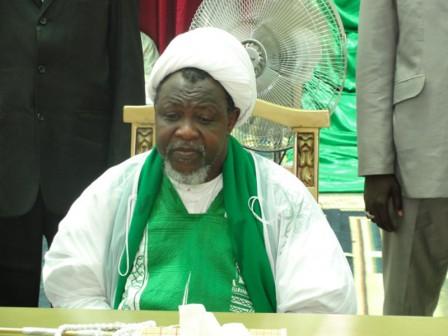The guns blazed, the smell of cordite against flesh stung the air, announcing deaths, yes, and mortification of human beings from this existence. As the smokes from the blazing muzzles, smoke from teargas and smoke from burning structures blew gently away against the eerie breeze, the physical and emotional picture became apparent.
Those who were expected to be sombre spectators to the gory incidence threw themselves in the frenzy of stealing from the stacks of bodies, while some plunder through demolished buildings. Is it because the victims are Shiites?
Was it not possible for a different ending to the Shiite/army debacle? Why the unyielding rumpus by the sect members before the attack, why couldn’t a phone call between leadership of the sect and the Nigerian army douse the heat, why is the reaction from Iran so intense?
The recent military encounter with Shiite Muslims in Zaria will remain a point of reference to so many emerging issues, just as questions will continue to beg for answers. The necessity of using “excessive” force on belligerent civilians, the limit of rights to worship, the emerging reality of a parallel government and the involvement of Iran are variables in the bourgeoning social, political twist in the unfolding development.
Therefore, before sonorous speeches obliterate a looming precipitate, it is necessary to understand the odoriferous, needless loss of lives. It is also pertinent to understand that a Shiite is a Nigerian with rights. The boundaries of every human right must however be highlighted to factor out where and when that of others begin in a dynamic country like Nigeria.
It is therefore instructive to understand the personae, Ibrahim El-Zak-Zaki, leader of Shiite Muslims in Nigeria. After graduating from the university in 1970’s Zak-Zaki led a group of Muslims to protest secularism and support Iran’s Islamic revolution in 1979. He met the then Iranian leader Ayatollah Khomeini in 1980 to accept the Iranian brewed Shi’a Islamic sectarian practice.
El-Zak-Zaki and his Shiite sect are not new to controversies. Sheikh Zak-Zaky was a political prisoner for nine years during the 1980s and 1990s, accused by successive military regimes of civil disobedience. His supporters have been involved in many violent clashes over decades.
Key issues in the miasma include the nature/ perspectives of the sect, which takes us to its origin in Iran (alleged terror persuasion) and the apparent “Ayatollanism”. Then the alleged perception of the sect being above the Nigerian state, stereotype of violence continues to trail them.
About Shiite/Iranian link, it is important to intimate that in 1979, Iran was accused by members of the international community of funding, providing equipment, weapons, training and giving sanctuary to terrorists. They have been linked since that time with extreme practice, spreading tentacles across the globe using the Shia sect to perpetuate terror. Their antecedent therefore raises red flag when their protégé appears to tilt their direction.
Iran has also managed to attain a lugubrious position of banker and major sponsor of terrorism in important regions like Lebanon through Hezbollah in the Middle East, in the Palestinian Territories. Their activities raising concerns about what the country is doing in the southern part of Iraq.
Therefore, against the backdrop of their pro-terror stance the Iranian influence on El-Zak-Zaki became apparent in 2009, when he remarked “Iran is waxing stronger in Nigeria through me, and this is why they want to attack us, to finally slay the growing Iranian influence and our movement.” He made the declaration when members of Islamic Movement in Nigeria (IMN) were arrested over clashes in Sokoto, which led to the death of a Sunni cleric.
The question as to his running a parallel government is indeed premised on the way and manner members of the set are given military training, fully clad in regalia tailored in various military fashion. The video clips of altercation with the military has also revealed how defiant they were to constituted authority.
It is common knowledge the sect led by Sheikh Zak-Zaki has a long running battle with constituted authority in Nigeria (stated earlier). However, the involvement of Iranian government on a domestic matter is the most nauseating dimension in the ongoing matter. Considering antecedent of Iran on religious extremism, it is indeed a potential treat to national security.
Nigerians may recall that in 2013 weapons linked to Hezbollah and Iranian government were once intercepted and confiscated in Kano. Who was the weapon meant for and were those linked to it ever identified and sanctioned or was it managed diplomatically?
Based on the facts available about the sect, it is indeed educative to posit that their persuasion, perception, makes them volatile and an accident waiting to happen. While it is within the confines of acceptable right to belong to a religion and social association, the corporate integrity of Nigeria is indeed sacrosanct.
Investigation must therefore extend beyond the recent clash. While the sect must be sensitized and psychologically persuaded to accept total allegiance to their country, Iran must be probed over support of extreme religious views in Nigeria. Meanwhile, no more force should be used, no need to expend any life. This is indeed the best time for dialogue before it spirals to another terror organization.
A standard must be set for all religious bodies in the country to uphold the tenets of the constitution from a broader perspective. A decision must also be reached on amount of influence a country, a group of people should have on any religion regardless of persuasion. It is instructive for Nigerians to acquire basic knowledge on how to avoid religious mediated acts of violence to avoid radicalism and subsequent avoidable death.
Written by, Israel A. Ebije
[email protected]
@ebijeisrael

